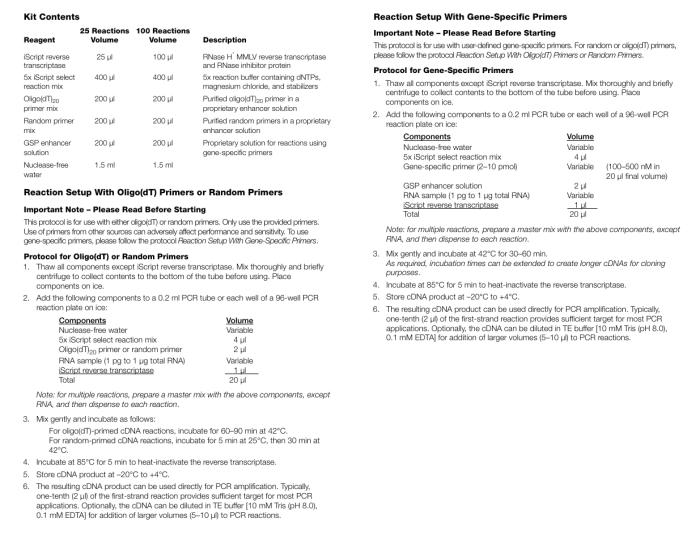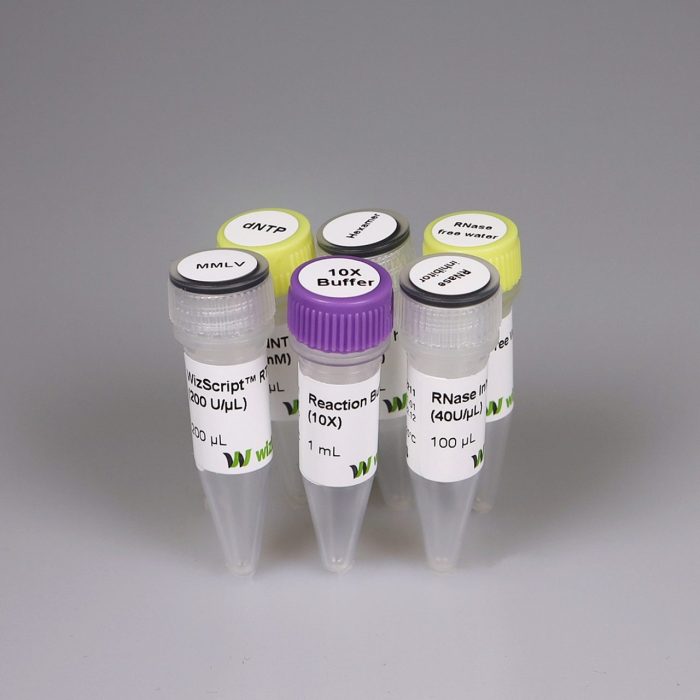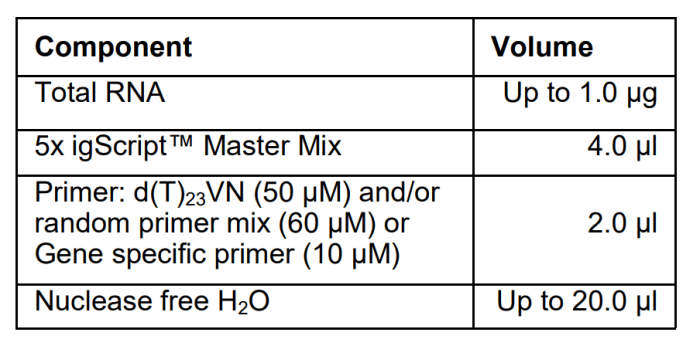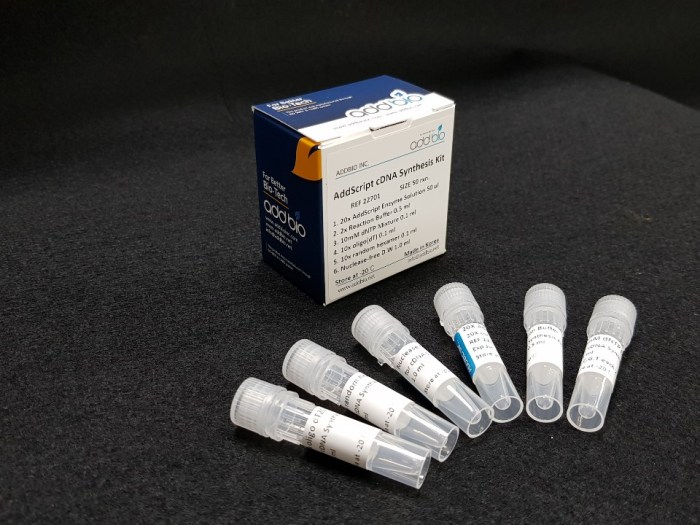The iScript cDNA Synthesis Kit Protocol, an indispensable tool in molecular biology research, empowers scientists to embark on a journey of genetic exploration. This comprehensive guide delves into the intricacies of this protocol, unraveling its components, applications, and troubleshooting techniques, providing researchers with a roadmap to successful cDNA synthesis.
With its meticulous step-by-step instructions and in-depth analysis, this protocol serves as a valuable resource for researchers seeking to harness the power of cDNA synthesis in their investigations.
Introduction

The iScript cDNA Synthesis Kit is designed to efficiently convert RNA into cDNA, which is essential for various downstream applications such as gene expression analysis, genotyping, and cloning. The cDNA synthesis process involves using reverse transcriptase to create a complementary DNA (cDNA) strand from an RNA template.
This cDNA strand can then be used for amplification and analysis.
Reverse Transcription
Reverse transcription is a fundamental step in the cDNA synthesis process. It is carried out by reverse transcriptase, an enzyme that uses RNA as a template to synthesize a complementary DNA strand. The process involves the following steps:
- Annealing of reverse transcriptase to the RNA template
- Extension of the DNA strand by adding nucleotides complementary to the RNA template
- Dissociation of the RNA template, leaving a single-stranded cDNA molecule
Kit Components
The iScript cDNA Synthesis Kit comprises various components, each with a specific role in the cDNA synthesis process.
The components included in the kit are:
- iScript Reverse Transcriptase:This is the enzyme that catalyzes the conversion of RNA to cDNA. It is a highly active and thermostable enzyme that ensures efficient and specific cDNA synthesis.
- 5x iScript Reaction Mix:This buffer contains all the necessary components for the reverse transcription reaction, including dNTPs, MgCl2, and reaction enhancers. It provides an optimal environment for the reverse transcriptase to function efficiently.
- RNase Inhibitor:This protein inhibits the activity of RNases, which are enzymes that can degrade RNA. Its inclusion prevents the degradation of RNA during the cDNA synthesis process, ensuring the integrity of the RNA template.
- Nuclease-Free Water:This water is used to dilute the RNA sample and other components of the reaction. It is free of nucleases, which can degrade nucleic acids, ensuring the purity and integrity of the reaction components.
Protocol

The iScript cDNA Synthesis Kit provides a convenient and efficient method for synthesizing first-strand cDNA from RNA templates. The kit contains all the necessary components for reverse transcription, including a thermostable reverse transcriptase, a reaction buffer, and a mixture of random hexamers and oligo(dT) primers.
The protocol is simple and straightforward, and can be completed in less than 2 hours. The following steps provide a detailed guide to using the iScript cDNA Synthesis Kit:
Reaction Setup
To set up the reaction, combine the following components in a nuclease-free microcentrifuge tube:
- 5 μL of 5x iScript Reaction Mix
- 1 μL of iScript Reverse Transcriptase
- 1 μg of RNA template
- Nuclease-free water to a final volume of 20 μL
Incubation Conditions
Once the reaction mixture is assembled, incubate it in a thermal cycler under the following conditions:
- 25°C for 5 minutes
- 42°C for 30 minutes
- 85°C for 5 minutes
Product Storage
The cDNA product can be stored at -20°C for up to 1 year. For long-term storage, the cDNA can be stored at -80°C.
Troubleshooting
The iScript cDNA Synthesis Kit is a reliable and efficient tool for synthesizing cDNA from RNA templates. However, like any experimental technique, certain issues may arise during the process. This section addresses common problems encountered during cDNA synthesis using the iScript cDNA Synthesis Kit and provides troubleshooting tips to resolve them.
It is crucial to note that the success of cDNA synthesis is influenced by various factors, including the quality and integrity of the RNA template, the efficiency of the reverse transcriptase enzyme, and the optimization of reaction conditions. By addressing potential issues and implementing appropriate troubleshooting measures, researchers can enhance the reliability and reproducibility of their cDNA synthesis experiments.
Low cDNA Yield
- Degraded RNA Template:Ensure the RNA template is intact and free from degradation. Use high-quality RNA extraction methods and store the RNA properly to prevent degradation.
- Insufficient Reverse Transcriptase Enzyme:Verify that the recommended amount of reverse transcriptase enzyme is used in the reaction. Increase the enzyme concentration if necessary.
- Suboptimal Reaction Conditions:Optimize the reaction conditions, including temperature, incubation time, and buffer composition, according to the manufacturer’s instructions.
- Inhibitors in the Reaction:Remove potential inhibitors, such as salts, EDTA, or contaminants, from the RNA template or reaction mix.
Non-Specific Amplification
- Primer Design:Design primers that are specific to the target gene and minimize primer-dimer formation.
- Annealing Temperature:Optimize the annealing temperature to ensure specific hybridization of primers to the target sequence.
- Contamination:Prevent contamination by using dedicated equipment and reagents for RNA handling and cDNA synthesis.
Failed Reverse Transcription, Iscript cdna synthesis kit protocol
- RNase Contamination:Eliminate RNase contamination by using RNase-free reagents and equipment.
- Reverse Transcriptase Inactivation:Ensure that the reverse transcriptase enzyme is active and stored properly.
- Insufficient Incubation Time:Extend the incubation time for the reverse transcription reaction to allow for complete cDNA synthesis.
Applications

The iScript cDNA Synthesis Kit is a versatile tool that enables the synthesis of high-quality cDNA from various RNA sources, including total RNA, mRNA, and small RNAs.
The resulting cDNA can be utilized in a wide range of molecular biology applications, such as:
Gene Expression Analysis
- Quantitative real-time PCR (qPCR): Measure the expression levels of specific genes.
- Reverse transcription PCR (RT-PCR): Amplify and detect specific RNA sequences.
- Microarray analysis: Study the expression patterns of thousands of genes simultaneously.
RNA-Seq
Generate cDNA libraries for next-generation sequencing (NGS) to analyze the transcriptome and identify novel transcripts.
Cloning and Functional Studies
Create cDNA clones for gene overexpression or knockdown studies to investigate gene function and regulation.
Diagnostics
Detect and quantify RNA biomarkers for disease diagnosis and monitoring, such as in cancer and infectious disease research.
Comparison to Other Kits: Iscript Cdna Synthesis Kit Protocol

The iScript cDNA Synthesis Kit outperforms other comparable kits on the market in several ways. It offers exceptional sensitivity and specificity, enabling researchers to detect and quantify even low-abundance transcripts with accuracy. Additionally, the kit provides consistent results across a wide range of RNA samples, including degraded or challenging samples.
One of the key advantages of the iScript cDNA Synthesis Kit is its ease of use. The protocol is straightforward and efficient, requiring minimal hands-on time. The kit also includes all necessary reagents and components, eliminating the need for additional purchases or preparation steps.
Advantages
- High sensitivity and specificity
- Consistent results with a wide range of RNA samples
- Ease of use and efficient protocol
- Includes all necessary reagents and components
Disadvantages
While the iScript cDNA Synthesis Kit offers numerous advantages, it also has a few potential disadvantages. The kit is relatively expensive compared to some other options on the market. Additionally, the reaction time can be longer than some other kits, which may be a consideration for researchers working with time-sensitive samples.
Conclusion

The iScript cDNA Synthesis Kit offers a reliable and efficient solution for cDNA synthesis. Its key features and benefits include:
- High cDNA yield and quality, ensuring accurate downstream applications.
- Fast and efficient reaction time, minimizing hands-on time.
- Robust performance across a wide range of RNA templates, including degraded or low-abundance samples.
- Compatibility with various downstream applications, including qPCR, RT-PCR, and microarrays.
Researchers considering using the iScript cDNA Synthesis Kit are recommended to:
- Use high-quality RNA as input to ensure optimal cDNA synthesis.
- Optimize reaction conditions, such as RNA concentration and reaction volume, to maximize cDNA yield.
- Validate the synthesized cDNA using appropriate quality control measures, such as qPCR or gel electrophoresis.
FAQ Insights
What is the purpose of the iScript cDNA Synthesis Kit?
The iScript cDNA Synthesis Kit is designed to facilitate the conversion of RNA into complementary DNA (cDNA), a crucial step in gene expression analysis and other molecular biology applications.
What are the key components of the iScript cDNA Synthesis Kit?
The kit includes a blend of enzymes, buffers, and nucleotides essential for efficient cDNA synthesis, including reverse transcriptase, RNase inhibitor, dNTPs, and reaction buffer.
How can I troubleshoot common problems encountered during cDNA synthesis using the iScript cDNA Synthesis Kit?
The protocol provides troubleshooting tips for various issues, such as low cDNA yield, non-specific amplification, and primer-dimer formation.